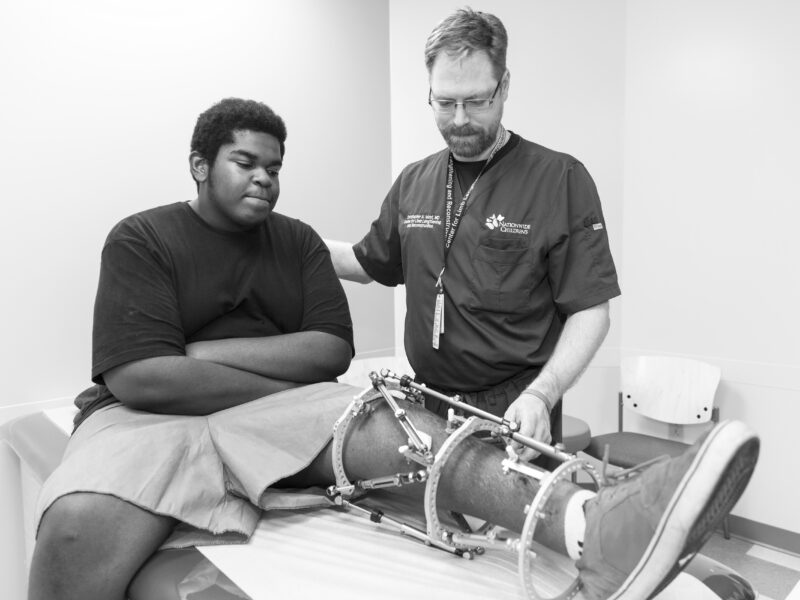Reducing Opioid-Induced Constipation in Patients After Orthopedic Spine Surgery
Reducing Opioid-Induced Constipation in Patients After Orthopedic Spine Surgery https://pediatricsnationwide.org/wp-content/uploads/2020/06/122016ds0034-samora-header-1024x575.jpg 1024 575 JoAnna Pendergrass, DVM JoAnna Pendergrass, DVM https://pediatricsnationwide.org/wp-content/uploads/2021/03/pendergrass_01.jpg- November 12, 2020
- JoAnna Pendergrass, DVM

In pediatric patients undergoing orthopedic spine surgery, a step-wise bowel management plan can effectively reduce opioid-induced constipation and unplanned emergency department visits after surgery.
Orthopedic spine surgery can generate pain in the immediate post-surgery period. Opioids are needed to mitigate this pain but commonly cause constipation and other gastrointestinal side effects.
Opioid-induced constipation causes abdominal pain, nausea and vomiting, as well as more serious health consequences. “Post-operative ileus, secondary to opioid-induced constipation, could lead to life-threatening bowel obstructions,” says Julie Samora, MD, PhD, an orthopedic surgeon at Nationwide Children’s Hospital.
Opioid-induced constipation is also a costly healthcare burden for patients, patients’ families, and the healthcare system, as evidenced by unplanned Emergency Department (ED) visits and hospital re-admissions.
Unfortunately, with orthopedic spine surgery, bowel function can be neglected in favor of ensuring adequate pain control and oral nutrition, explains Carlo Di Lorenzo, MD, Chief of the Division of Pediatric Gastroenterology, Hepatology, and Nutrition at Nationwide Children’s.
To date, a standardized post-operative bowel management plan for opioid-induced constipation has not been developed.
To address this gap in patient care, Dr. Samora and her research team collaborated with Nationwide Children’s gastroenterology team to develop a step-wise bowel management plan for pediatric patients undergoing orthopedic spine surgery.
Implementing the plan markedly reduced opioid-induced constipation and decreased unplanned ED visits and hospital re-admissions. Study results were recently published in Spine Deformity.
The plan, which was created as an algorithm, was divided into inpatient and at-home bowel management.
The inpatient bowel management plan included a key change: replacing polyethylene glycol with the stimulant laxative Senna.
Concerns about patient safety and potential drug dependence with Senna have discouraged its use in children. However, scientific evidence does not support these concerns, explains Dr. Samora.
For the at-home bowel management section of the plan, the team created an Epic smart phrase on bowel management and included it on the After-Visit Summary. Patients and their families received this summary and the Helping Hands educational tool “Diet: High Fiber” before discharge.
Orthopedic providers and nurses were introduced to the plan before its implementation.
After implementation, the research team evaluated inpatient medication prescribing compliance, outpatient compliance and the frequency of ED visits or hospital re-admissions for opioid-induced constipation.
Outpatient compliance was measured according to patient education provided by a nurse or other medical provider before discharge.
The team observed 93% overall compliance. The number of ED or urgent care visits, or re-admissions dropped significantly, from 1 in every 11 cases at baseline to 1 in 184 cases.
For the study’s patients, there were no constipation-related ED visits or re-admissions for two years following implementation of the bowel management plan.
These findings demonstrate the effectiveness of a step-wise bowel management plan to improve patient care and safety and reduce the health care burden for pediatric patients undergoing orthopedic spine surgery.
“We have implemented this standard bowel management plan for every patient undergoing spine procedures at Nationwide Children’s. The plan could easily be used for patients undergoing other types of procedures,” Dr. Samora says.
Evaluating outpatient compliance of the bowel management plan was limited by the difficulty in measuring compliance after discharge. The next research project will focus on evaluating this compliance.
Given the potential consequences of opioid-induced constipation after orthopedic spine surgery, Dr. Di Lorenzo advises clinicians to manage this post-operative constipation with vigilance and use stimulant laxatives as needed.
Reference:
Seilhamer C, Di Lorenzo C, Holstine J, Samora JB. Creating a bowel management plan for pediatric orthopaedic spine surgery patients. Spine Deformity. 2020 Sep 25.
Photo credit: Nationwide Children’s
About the author
JoAnna Pendergrass, DVM, is a veterinarian and freelance medical writer in Atlanta, GA. She received her veterinary degree from the Virginia-Maryland College of Veterinary Medicine and completed a 2-year postdoctoral research fellowship at Emory University’s Yerkes Primate Research Center before beginning her career as a medical writer.
As a freelance medical writer, Dr. Pendergrass focuses on pet owner education and health journalism. She is a member of the American Medical Writers Association and has served as secretary and president of AMWA’s Southeast chapter.
In her spare time, Dr. Pendergrass enjoys baking, running, and playing the viola in a local community orchestra.
-
JoAnna Pendergrass, DVMhttps://pediatricsnationwide.org/author/joanna-pendergrass-dvm/
-
JoAnna Pendergrass, DVMhttps://pediatricsnationwide.org/author/joanna-pendergrass-dvm/
-
JoAnna Pendergrass, DVMhttps://pediatricsnationwide.org/author/joanna-pendergrass-dvm/
-
JoAnna Pendergrass, DVMhttps://pediatricsnationwide.org/author/joanna-pendergrass-dvm/
- Posted In:
- In Brief










